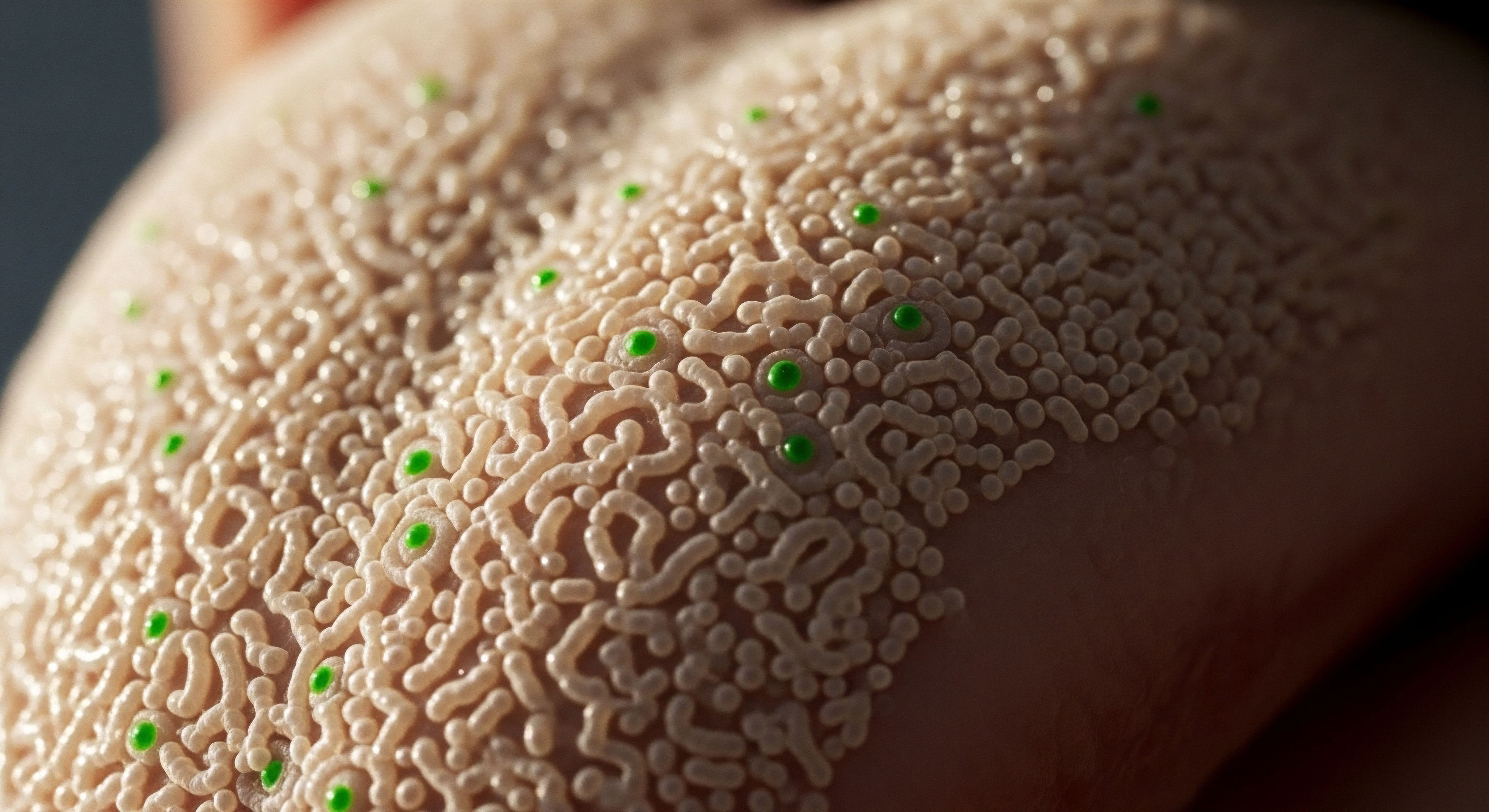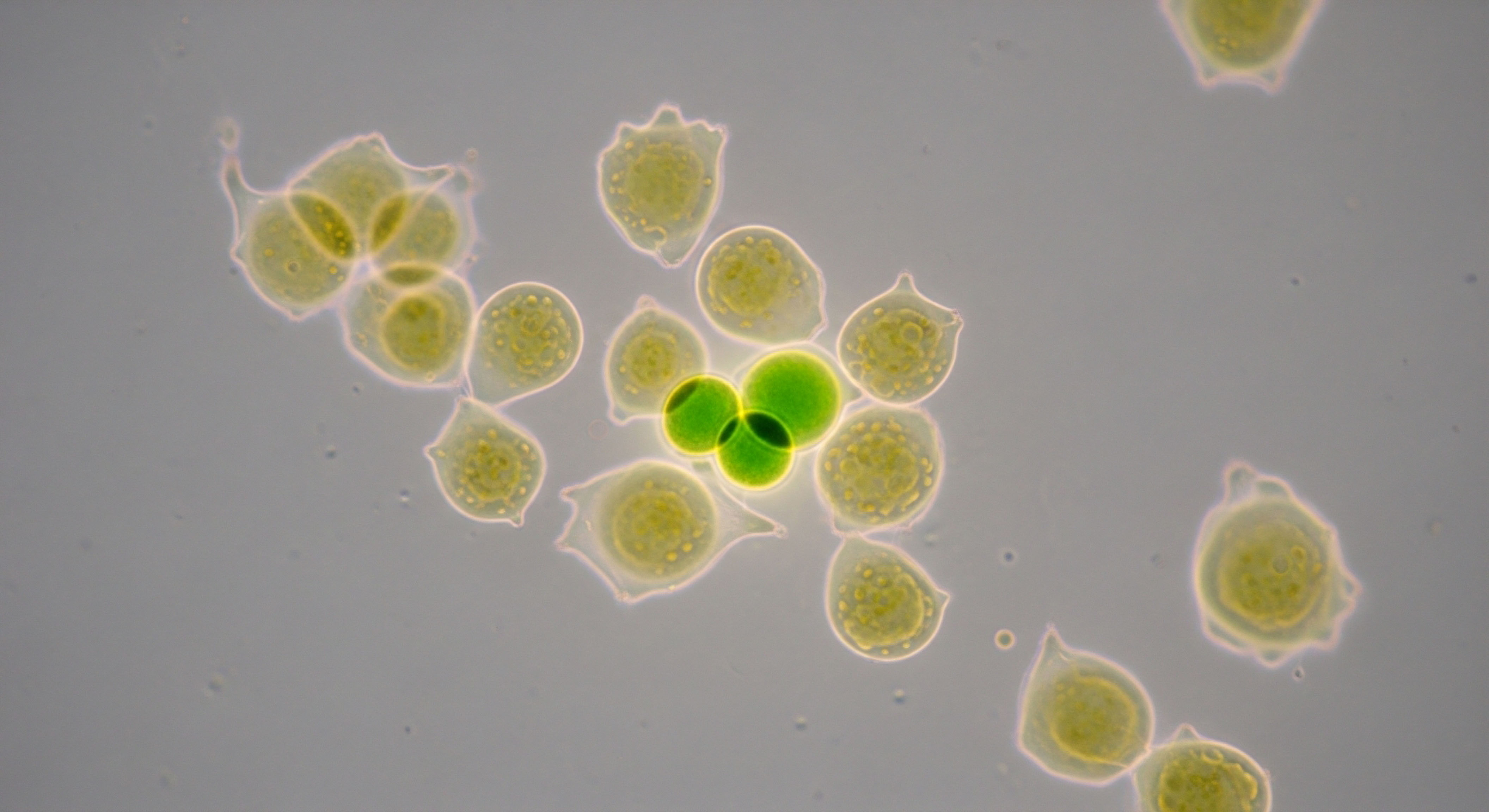

Fundamentals
You may have noticed a subtle shift in your mental clarity. The name that used to be on the tip of your tongue now feels miles away. The focus required for a complex task seems to dissipate like morning mist.
This experience, often dismissed as a simple consequence of age or stress, has deep roots in your body’s intricate internal communication network. Your biology is speaking to you through these symptoms, and understanding its language is the first step toward reclaiming your cognitive vitality.
The conversation begins with testosterone, a hormone that does far more than regulate libido and build muscle. It is a powerful modulator of your central nervous system, directly influencing the architecture and function of your brain.
Testosterone interacts with receptors located throughout the brain regions responsible for memory, attention, and spatial reasoning. Its presence supports the health and resilience of neurons, the very cells that transmit information. When levels of this critical hormone decline, the signaling can become less efficient.
This is not a failure of your mind; it is a predictable physiological response to a change in your internal biochemical environment. Your body is a single, integrated system where hormonal balance and cognitive sharpness are intrinsically linked. Therefore, addressing cognitive symptoms requires looking at the health of the entire system.

The Cellular Foundation of Mental Energy
Your capacity for sharp thought and sustained focus is built upon a foundation of metabolic health. Every cell in your body, including your brain cells, requires energy to function. This energy is derived from the nutrients you consume and is managed by a host of hormonal signals.
Insulin, for example, is a primary regulator of blood sugar. When this system is functioning well, your brain receives a steady supply of fuel. Chronic dietary stress, characterized by high intake of processed carbohydrates and sugars, can disrupt this delicate balance, leading to insulin resistance.
This condition creates a state of systemic inflammation, a low-grade immune response that affects every organ, including the brain. Brain inflammation is a direct antagonist to clear thinking, contributing significantly to feelings of mental fog and fatigue.
The clarity of your thoughts is directly connected to the metabolic health of your entire body.
Simultaneously, the body’s ability to produce and utilize testosterone is compromised in an inflammatory environment. The very same lifestyle factors that disrupt metabolic health also suppress the Hypothalamic-Pituitary-Gonadal (HPG) axis, the command-and-control pathway for testosterone production.
Your body, sensing a state of systemic stress, diverts resources away from functions it deems non-essential for immediate survival, including optimal cognitive and reproductive health. This is a brilliant, ancient survival mechanism. In the modern world, this response can become chronically activated by lifestyle, leading to a downward spiral of metabolic dysfunction, low testosterone, and cognitive decline.

Movement as a Neurological Signal
Physical activity is a potent signal to your body and brain. It is a form of positive, acute stress that stimulates powerful adaptive responses. Engaging in regular exercise, particularly resistance training, directly communicates a need for strength and resilience to your musculoskeletal and endocrine systems.
This demand triggers an increase in testosterone production to support muscle repair and growth. The benefits extend directly to your brain. Exercise enhances blood flow, delivering more oxygen and nutrients to neural tissues. It also stimulates the release of Brain-Derived Neurotrophic Factor (BDNF), a remarkable protein that acts like a fertilizer for your brain cells, promoting the growth of new neurons and strengthening existing connections. This process, known as neurogenesis, is fundamental to learning and memory.
Sleep is another non-negotiable pillar of hormonal and cognitive health. The majority of your daily testosterone release occurs during the deep stages of sleep. Consistently failing to get adequate, high-quality sleep sends a powerful stress signal to your body, elevating cortisol levels and directly inhibiting testosterone production.
A single night of poor sleep can measurably impact your hormonal profile the following day. Over time, chronic sleep deprivation creates a significant headwind against any effort to optimize your endocrine health, making cognitive enhancement an uphill battle. Prioritizing sleep is a direct investment in your brain’s ability to function at its peak.


Intermediate
To truly appreciate how lifestyle choices can amplify testosterone’s cognitive benefits, we must examine the specific mechanisms at play. These interventions are not passive influences; they are active modulators of your physiology. They work by optimizing the body’s internal environment, making it more receptive to hormonal signals and more efficient at producing the molecules that support brain health.
This is about recalibrating the system from the ground up, ensuring that when testosterone is present, it can perform its neurological duties without impediment.

Nutritional Biochemistry and Hormonal Synthesis
Your dietary intake provides the raw materials for hormone production. Testosterone synthesis is a multi-step biochemical process that depends on the availability of specific micronutrients. A diet lacking these essential components is like a factory with a disrupted supply chain; production falters, regardless of the demand. By focusing on nutrient density, you provide the endocrine system with the tools it needs to function correctly.
- Zinc ∞ This mineral is a critical co-factor for enzymes involved in testosterone synthesis. A deficiency in zinc can directly lead to a state of hypogonadism. Foods rich in zinc, such as oysters, red meat, and pumpkin seeds, directly support the foundational steps of hormone production.
- Magnesium ∞ Leafy green vegetables like spinach and Swiss chard are excellent sources of magnesium. This mineral plays a role in modulating the activity of Sex Hormone-Binding Globulin (SHBG), a protein that binds to testosterone in the bloodstream, rendering it inactive. By optimizing magnesium levels, more free testosterone becomes available to enter tissues, including the brain.
- Healthy Fats ∞ Cholesterol is the direct precursor molecule from which all steroid hormones, including testosterone, are synthesized. Diets that are excessively low in fat can compromise this entire process. Prioritizing healthy sources of fat, such as avocados, olive oil, and nuts, ensures the availability of this essential building block.
Beyond providing raw materials, nutrition profoundly impacts the inflammatory status of the body. A diet centered on whole, unprocessed foods helps to regulate blood sugar and improve insulin sensitivity. This calms the systemic inflammation that can interfere with both testosterone signaling and direct brain function. Reducing inflammation is akin to clearing static from a communication line, allowing for a cleaner, more precise signal between the hormone and its target receptors in the brain.

What Is the Role of Exercise in Neuro-Endocrine Health?
Different forms of exercise send distinct signals to the body, each with unique benefits for cognitive and hormonal health. A well-rounded physical activity program leverages these different signals to create a powerful, synergistic effect. The goal is to stimulate adaptation in a way that enhances both testosterone output and brain plasticity.
| Exercise Type | Primary Hormonal Effect | Primary Neurological Effect | Mechanism of Action |
|---|---|---|---|
| Resistance Training | Increases acute testosterone production. | Enhances motor unit recruitment and neuro-muscular coordination. | Mechanical loading of muscle tissue signals the HPG axis to upregulate androgen production for repair and growth. |
| High-Intensity Interval Training (HIIT) | Boosts growth hormone and testosterone release. | Significantly increases Brain-Derived Neurotrophic Factor (BDNF). | Short bursts of maximal effort create a strong metabolic demand, triggering a potent adaptive hormonal and neurotrophic response. |
| Steady-State Cardio | Improves insulin sensitivity and reduces cortisol over time. | Increases cerebral blood flow and supports cardiovascular health. | Enhances the efficiency of the cardiovascular system, reducing baseline stress and improving nutrient delivery to the brain. |

The Cortisol-Testosterone Axis a Delicate Balance
Your body’s stress response system, the Hypothalamic-Pituitary-Adrenal (HPA) axis, exists in a dynamic and often oppositional relationship with your testosterone-producing HPG axis. Both systems draw from the same pool of precursor hormones, most notably pregnenolone. During periods of chronic stress, the body prioritizes the production of the stress hormone cortisol.
This sustained demand can lead to a phenomenon sometimes referred to as “pregnenolone steal,” where the resources that would normally be used to produce testosterone are shunted toward the cortisol production pathway. This creates a direct biochemical competition in which testosterone often loses.
Managing stress is a direct method of protecting your testosterone production pathways.
Furthermore, elevated cortisol has a suppressive effect on the signaling from the hypothalamus and pituitary gland, which are the master regulators of testosterone production. It essentially tells the command center to power down testosterone synthesis. Lifestyle interventions aimed at stress modulation are therefore critical.
Practices such as mindfulness meditation, controlled breathing exercises, and ensuring adequate time for recovery and leisure are not luxuries; they are essential tools for maintaining the integrity of the HPG axis. By managing cortisol, you protect the entire upstream signaling cascade required for healthy testosterone levels, allowing the hormone to effectively support cognitive processes.


Academic
A sophisticated analysis of testosterone’s cognitive efficacy requires moving beyond a simple model of hormone replacement. The central nervous system’s response to androgens is profoundly influenced by the systemic environment in which those hormones operate.
Clinical evidence increasingly demonstrates that lifestyle interventions are a determining factor in this equation, creating the necessary physiological conditions for testosterone to exert its maximal therapeutic effect on cognition. This is particularly evident in populations where metabolic dysfunction and hypogonadism coexist, a common clinical scenario in aging men.

Evidence from the LITROS Randomized Clinical Trial
The Lifestyle Intervention and Testosterone Replacement in Obese Seniors (LITROS) trial provides a powerful framework for understanding this synergy. This study was a randomized clinical trial involving older men with obesity and clinical hypogonadism, a population at high risk for age-related cognitive decline.
The researchers sought to determine if adding testosterone replacement therapy to an intensive lifestyle intervention would yield greater cognitive benefits than the lifestyle intervention alone. The design of this trial is what makes its findings so illuminating. One group received the lifestyle intervention plus a placebo, while the other received the same lifestyle intervention plus testosterone therapy. This allows for the isolation of testosterone’s effects within the context of a controlled, optimized physiological baseline.
The results were compelling. While the group undergoing the lifestyle intervention with a placebo did see improvements in cognitive scores, the group that also received testosterone (LT + Test) demonstrated significantly greater gains. The global cognition z-score, a composite measure of overall cognitive function, increased substantially more in the LT + Test group.
Specifically, this group showed superior improvements in the domains of attention, information processing speed, and memory. This finding is critical because it shows that even when positive lifestyle behaviors are established and controlled for, testosterone provides an additional, measurable benefit to cognitive function.
Clinical trial data suggest testosterone therapy amplifies cognitive gains when combined with a structured lifestyle intervention.
The implications of the LITROS trial are significant. It suggests that lifestyle intervention prepares the brain to respond to testosterone. Obesity is characterized by a state of chronic, low-grade inflammation and increased activity of the aromatase enzyme, which converts testosterone into estradiol.
This systemic inflammation can impair blood-brain barrier function and promote neuroinflammation, blunting the brain’s sensitivity to hormonal signals. The intensive lifestyle intervention, which included diet and exercise, would have directly addressed these issues by reducing adiposity, improving insulin sensitivity, and lowering inflammatory markers. By creating a less inflamed, more metabolically stable environment, the intervention likely enhanced the brain’s ability to utilize the administered testosterone effectively.

How Do Metabolic Factors Predict Cognitive Improvement?
Further analysis of the LITROS data revealed that changes in specific physiological markers were independent predictors of the improvement in global cognition. These included changes in peak oxygen consumption (a measure of aerobic fitness), muscle strength, total testosterone levels, and luteinizing hormone (LH) levels.
This is a clear demonstration of a systems-biology principle ∞ interconnected physiological networks jointly determine clinical outcomes. The improvement in cognition was not solely dependent on the rise in testosterone; it was also linked to improvements in physical capacity and the function of the HPG axis itself.
This points to a multi-faceted mechanism. Improved aerobic fitness enhances cerebral perfusion and BDNF expression. Increased muscle strength is associated with better glucose disposal and reduced insulin resistance. The change in LH suggests a partial restoration of the central signaling that governs natural testosterone production.
Testosterone therapy, when administered within this context of global physiological improvement, acts as a powerful amplifier. It can more effectively bind to androgen receptors in the hippocampus and prefrontal cortex when the local cellular environment is not compromised by inflammation or metabolic dysregulation.
| Cognitive Domain | Lifestyle + Placebo Group (Mean Change) | Lifestyle + Testosterone Group (Mean Change) | Significance |
|---|---|---|---|
| Global Cognition Z-Score | 0.21 | 0.49 | Significant between-group difference |
| Attention/Information Z-Score | 0.23 | 0.55 | Significant between-group difference |
| Memory Z-Score | 0.37 | 0.90 | Significant between-group difference |

The Role of Adaptogens and Stress Axis Modulation
Beyond the foundational pillars of diet and exercise, a more nuanced biochemical approach involves the modulation of the HPA axis. The chronic elevation of cortisol is a potent catabolic and neuroinflammatory signal that directly opposes the anabolic and neuroprotective effects of testosterone.
Botanical agents known as adaptogens, such as Ashwagandha (Withania somnifera), have been studied for their ability to buffer the physiological response to stress. Research indicates that Ashwagandha can help lower cortisol levels, which may in turn alleviate the suppressive pressure on the HPG axis.
By helping to rebalance the cortisol-to-testosterone ratio, such interventions may further sensitize the brain to testosterone’s cognitive benefits. This represents a more targeted lifestyle strategy, aimed at fine-tuning the delicate interplay between the body’s primary hormonal axes to create an optimal state for neurological performance.

References
- Valiyeva, E. et al. “Cognitive response to testosterone replacement added to intensive lifestyle intervention in older men with obesity and hypogonadism ∞ prespecified secondary analyses of a randomized clinical trial.” The American Journal of Clinical Nutrition, vol. 114, no. 5, 2021, pp. 1655-1665.
- PubMed. “Cognitive response to testosterone replacement added to intensive lifestyle intervention in older men with obesity and hypogonadism ∞ prespecified secondary analyses of a randomized clinical trial.” National Library of Medicine, 2021, pubmed.ncbi.nlm.nih.gov/34751412/.
- Lopresti, A. L. et al. “The Effects of a Commercialised Withania somnifera Extract on Stress, Anxiety and Depression, Cortisol and Testosterone in Overweight Adults.” Specific-Interventions-for-the-Management-of-Low-Testosterone-in-Obese-Men, 2019.
- “8 Proven Ways to Increase Testosterone Levels Naturally.” Healthline, 2022.
- “The best foods to boost low testosterone.” Medical News Today, 2023.

Reflection
The information presented here offers a map of the intricate connections between your daily choices, your hormonal state, and your mental acuity. It demonstrates that the body functions as a unified whole, where the health of one system profoundly impacts the function of another.
Your personal health journey is a process of understanding this internal landscape. Consider the patterns in your own life. Think about the relationship between your energy levels, your diet, your physical activity, and the sharpness of your focus. The knowledge you have gained is the first step. The path forward involves applying these principles in a way that is tailored to your unique biology and lived experience, transforming scientific understanding into personal vitality.

Glossary

metabolic health

systemic inflammation

testosterone production

brain-derived neurotrophic factor

insulin sensitivity

hpg axis

testosterone levels

randomized clinical trial

testosterone replacement

intensive lifestyle intervention

lifestyle intervention

litros trial

neuroinflammation

androgen receptors




